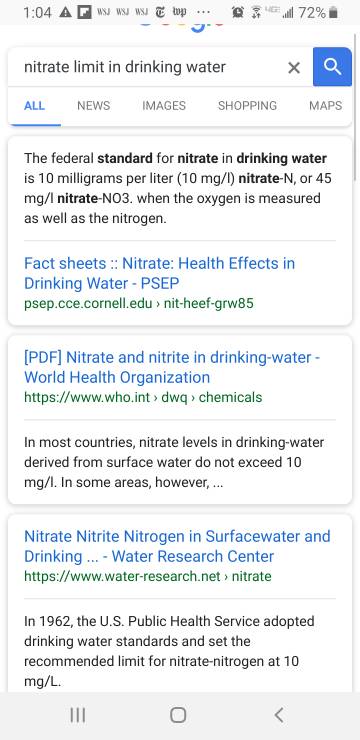Navigation
Install the app
How to install the app on iOS
Follow along with the video below to see how to install our site as a web app on your home screen.
Note: This feature may not be available in some browsers.
More options
You are using an out of date browser. It may not display this or other websites correctly.
You should upgrade or use an alternative browser.
You should upgrade or use an alternative browser.
Can high nitrates or phosphates kill inverts?
- Thread starter BigJohnny
- Start date
- Tagged users None
I dont know why physiologically but ever where I have read about inverts says something like this
This is from LA
Like other invertebrates, the Scarlet Skunk Cleaner Shrimp is intolerant of copper-based medications, high nitrate levels, and fluctuating water parameters.
Like other invertebrates, the Margarita Snail is sensitive to high nitrate levels and copper-based medications.
This is from LA
Like other invertebrates, the Scarlet Skunk Cleaner Shrimp is intolerant of copper-based medications, high nitrate levels, and fluctuating water parameters.
Like other invertebrates, the Margarita Snail is sensitive to high nitrate levels and copper-based medications.
High nitrate is vaguely like a high level smog alert, but day after day after day after day.
It isn't lethal for a few days, but would be debilitating every single day for a year.
FWIW, 10 is the limit for drinking water in the USA. [emoji33]

It isn't lethal for a few days, but would be debilitating every single day for a year.
FWIW, 10 is the limit for drinking water in the USA. [emoji33]

Yea I've heard the high nitrate thing but never seen a specific number. Some would consider 20ppm very high but others would say 100ppm. Never heard anything about phosphate though. Curious if there is any scientific reason to be worried about either.
@Randy Holmes-Farley
@Randy Holmes-Farley
He already wrote thisYea I've heard the high nitrate thing but never seen a specific number. Some would consider 20ppm very high but others would say 100ppm. Never heard anything about phosphate though. Curious if there is any scientific reason to be worried about either.
@Randy Holmes-Farley
http://reefkeeping.com/issues/2005-06/rhf/index.php
The internalized nitrite then causes a number of internal disturbances, including loss of potassium from certain tissues (such as skeletal muscle) and the oxidation of hemoglobin into methemoglobin, which reduces the blood's oxygen carrying capacity. This can cause reduced tissue oxygenation, hyperventilation and heart rate increases. Many other biochemical pathways become altered as well, including steroid synthesis, vasodilation (blood vessel enlargement) and changes in internal levels of ammonia and urea. Nitrite detoxification in freshwater fish is accomplished by direct nitrite excretion and by internal conversion of nitrite into nitrate.23
Perhaps this is what you seek.
Based on the results of the ecotoxicity test of phosphate using fish, Daphnia, and algae, L(E)C50 was above 100 mg/L (nominal), indicating no toxicity. In general, the total phosphorus concentration including phosphate in rivers and lakes reaches levels of several ppm, suggesting that phosphate has no toxic effects. However, excessive inflow of phosphate into aquatic ecosystems has the potential to cause eutrophication due to algal growth.
Lots of good stuff here.
https://www.reef2reef.com/threads/randys-reef-chemistry-articles.174821/
https://www.reef2reef.com/threads/randys-reef-chemistry-articles.174821/
This is the newest review I could find (2018) Although it is done a lot of NO3 toxicity studies (both acute and chronical) in freshwater – there is not many done in saltwater. Note that most figures we see in this article is as NO3-N and in order to have mg/l (ppm) NO3 – the figures should be multiplicated with 4.43. If you read 10mg/l (ppm) NO3-N (nitrate nitrogen) – the NO3 (nitrate) concentration is 44.3 mg/l (ppm).
It seems like we (aquarists) overestimate the NO3 toxicity even for invertebrates
Sincerely Lasse
It seems like we (aquarists) overestimate the NO3 toxicity even for invertebrates
Sincerely Lasse
That's nitrite not nitrateHe already wrote this
http://reefkeeping.com/issues/2005-06/rhf/index.php
The internalized nitrite then causes a number of internal disturbances, including loss of potassium from certain tissues (such as skeletal muscle) and the oxidation of hemoglobin into methemoglobin, which reduces the blood's oxygen carrying capacity. This can cause reduced tissue oxygenation, hyperventilation and heart rate increases. Many other biochemical pathways become altered as well, including steroid synthesis, vasodilation (blood vessel enlargement) and changes in internal levels of ammonia and urea. Nitrite detoxification in freshwater fish is accomplished by direct nitrite excretion and by internal conversion of nitrite into nitrate.23
Perhaps this is what you seek.
That's why I figured. Thanks LasseThis is the newest review I could find (2018) Although it is done a lot of NO3 toxicity studies (both acute and chronical) in freshwater – there is not many done in saltwater. Note that most figures we see in this article is as NO3-N and in order to have mg/l (ppm) NO3 – the figures should be multiplicated with 4.43. If you read 10mg/l (ppm) NO3-N (nitrate nitrogen) – the NO3 (nitrate) concentration is 44.3 mg/l (ppm).
It seems like we (aquarists) overestimate the NO3 toxicity even for invertebrates
Sincerely Lasse
Similar threads
- Replies
- 8
- Views
- 220
- Replies
- 5
- Views
- 158
- Replies
- 11
- Views
- 345
- Replies
- 15
- Views
- 252
















